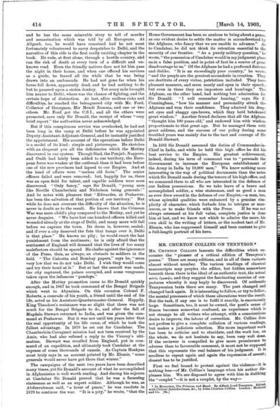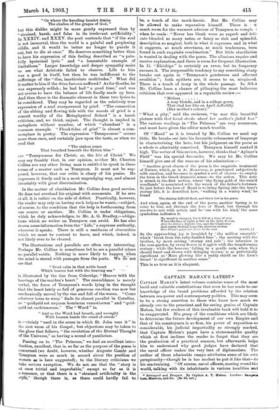MR CHURTON COLLINS ON TENNYSON.*
Mn. CHURTON Collaws laments the difficulties which en- counter the "pioneer of a critical edition of Tennyaon's poems." There are many editions, and in all of them variants almost without number. The various readings of classical manuscripts may perplex the editor, but hidden somewhere beneath them there is the ideal of an authentic text, the actual ain-Os lyptik, and they suggest the fascinating exercise of con- jectures whereby it may haply be discovered. Of authentic Tennysonian texts there are many. The poet changed and changed back again. It is interesting to follow, or try to follow, the mental processes of which these alterations were the result. But the task, if any one is to fulfil it exactly, is enormously large. Sometimes, too, it must be owned, the poet's sense of fitness becomes somewhat confused, an experience which is not strange to all writers who attempt, with a conscientious desire to improve, the labour of correction. Mr. Collins does not profess to give a complete collation of various readings, but makes a judicious selection. His more important work has been to criticise and to elucidate, and the work has, on the whole, we do not hesitate to say, been very well done. If the reviewer is compelled to give more prominence to adverse than to favourable comment, it must not be supposed that this represents the real balance of his judgment. It is needless to repeat again and again the expression of assent; dissent has to be justified.
First we feel bound to protest against theviolence.itis nothing less—of Mr. Collins's language when his author dis- pleases him. We are disposed to agree with him in disliking the "couplet "—it is not a couplet, by the way- * In Memoruint, The Princess, and Maud. By Alfred. Lord Tennyson. Edited, with Critical Introductions, &a., by John Cluirton Collins. London: Methuen and Co. [8s.]
"Or where the kneeling hamlet drains The chalice of the grapes of God;" but this dislike might be more gently expressed than by
strained, harsh, and false in its irrelevant artificiality." In xxxrv. and XXXV. the poet contends that" if the soul is not immortal, then the world is a painful and perplexing riddle, and it would be better no longer to puzzle it out, but to die at once." He deserves something better than to have his expression of this feeling described as "a pain- fully hysterical lyric" and "a lamentable example of limitations." Larger knowledge and deeper sympathy make us see what Aristotle failed to observe. Life to him was a good in itself, but then he was indifferent to the sufferings of the "dim, inarticulate multitudes." What did it matter to him if the ftn%ogi Uotatir suffered ? As for Goethe, be was supremely selfish ; he had had "a good time," and was not averse to have the balance of life finally made up here. And then there is the dramatic element in these two lyrics to be considered. They may be regarded as the relatively true expression of a soul overpowered by grief. "The connection of the ebbing and flowing tide with the moods of grief is a conceit worthy of the Metaphysical School" is a harsh criticism, and, we think, unjust. The thought is implied in metaphors without number, of which " abundant " is a common example. "Flood-tides of grief" is almost a com- monplace in poetry. The expression " Tennysonese " occurs more than once, and certainly jars upon the taste, as when we
read that
"The sinless years That breathed beneath the Syrian blue"
are " Tennysonese for Christ; or, the life of Christ." We may say frankly that, in our opinion, neither Mr. Churton Collins nor any other living man is entitled to speak in these terms of a master such as Tennyson. It must not be sup- posed, however, that our critic is chary of his praise. He expresses it freely and in a most ungrudging way, and almost invariably with great discrimination.
In the matter of elucidation Mr. Collins does good service. He does not overload his original with comments. If he errs at all, it is rather on the side of defect. Practically, however, the reader may rely on having such help as he wants,—subject, of course, to the condition that the help is forthcoming from one source or another. Mr. Collins is under obligations, which he duly acknowledges, to Mr. A. G-. Bradley,—obliga- tions which no writer on Tennyson can avoid. He has also drawn some information from the " Life," a supreme authority, wherever it speaks. There is still a residuum of obscurities which we must be content to leave, and which, indeed, is not likely ever to be cleared.
The illustrations and parallels are often very interesting. Perhaps Mr. Collins is sometimes led to see a parallel where no parallel exists. Nothing is more likely to happen when the mind is stored with passages from the poets. We • t not
see that
"Dead calm in that noble heart Which heaves but with the heaving sea" ' 7-- is illustrated by the line from Coleridge, "Heaves iwith the bearings of the maiden's heart." The resemblance is merely, verbal, the force of Tennyson's words lying in the thought that the heart lately so full of generous emotion was now but mechanically moved by the rise and fall of the waves. "Come whatever loves to weep" finds its closest parallel in Catullus, as " quidquid eat usquam hominum venustiorum and "quid- quid eat cachinnorum." The " Word " in
"And so the Word had breath, and wrought With human hands the creed of creeds"
is enrtainly "used in the sense in which St. John uses it" in the iirst verse of his Gospel ; but objections may be taken to the gloss that follows, "the revelation of the Eternal Thought of the Universe," as having a sound of pantheism.
Passing on to "The Princess," we find an excellent intro- duction, excellent, that is, so far as the purpose of the poem is concerned (we doubt, however, whether Auguste Conate ,and Tennyson were so much in accord about the position of women as is here suggested); to the literary criticisms we take serious exception. We do not see that the, "story is 4 once trivial and improbable," except so far as it is a romance, or that there is a "strained artificiality in the- stii," • thotigh there is, as there could hardly fail to
be, a touch of the mock-heroic. But Mr. Collins may be allowed to make reparation himself. There is - much room for the warmest admirer of Tennyson to complL
when he reads: "Never has blank verse so superb and deli- cate blended so many notes, or fancy so rich and splendid, description so magical, both in what it expresses and in what
it suggests, so much sweetness, so much tenderness, been found in such exquisite combination." But little elucidation is wanted in dealing with the poem. The allusions require and receive explanation, and there is room for frequent illustration. In Ii. "Rhodope" is certainly an error, but its frequency excuses it. The irrepressible tendency to say something sharp breaks out again in " Tennyson's ponderous and affected erudition"; both epithets are, it seems to us, misplaced. There is a touch of irony in the whole passage. In 301-4 Mr. Collins loses a chance of pillorying the most ludicrous criticism that ever appeared in a reputable review :— "Melissa
A rosy blonde, and in a college gown, That clad her like an April daffodilly (Her mother's colour).'
"What a pity," said the reviewer, "to mar this beautiful picture with that harsh stroke about her mother's faded hue."
The various readings in "The Princess" are very numerous, and must have given the editor much trouble.
Of "Hand" as it is treated by Mr. Collins we need say little. He breaks out into his favourite vehemence of language in characterising the hero, but his judgment on the poem as
a whole is admirably conceived. Tennyson himself ranked it high. The writer of this review, however, thinks that" Aylmer's
Field" was his special favourite. We may let Mr. Collins himself give one of the reasons of his admiration :—
"Another great charm of the poem is the exquisite treatment of Nature, which, as in in Memoriam, is penetrated subjectively with emotion, and becomes in symbol a sort of chorus—to employ the term in the Greek dramatic sense—to the action. This note is struck in the first section, where 'the flying gold of the mixed woodlands' is associated with the wreck of the father's fortunes. So just before the love of Maud is to bring Spring into the hero's stormy life, it is described how, 'walking in a wintry wind,' he found
The shining daffodil dead, and Orion low in his grave.
And when, again, at the end of the poem, another Spring is to come to him, not through the love of Maud, but through his resolve to mix with action and be one with his kind,' the same symbolism indicates it.
My mood is changed, for it fell at a time of year When the face of night is fair on the dewy downs, And the shining daffodil dies, and the Charioteer And 'starry Gemini hang like glorious crowns Over Orion's grave low down in the west. . (xxviii. i.)
So the approaching joy is heralded by 'the 'million emeralds' which break from the ruby-budded lime ' ; the meeting with the brother, bf morn arising stormy and pale'; the interview in the rose-garden, by every flower in it aglow with the transforming ecstasy ; while the heavens falling in a gentle rain, when they should burst and drown with deluging storms,' is as pathetically significant as 'Mars glowing like a ruddy shield on the Lion's breast' is significant in another sense."
This is as true as it is eloquent.











































 Previous page
Previous page